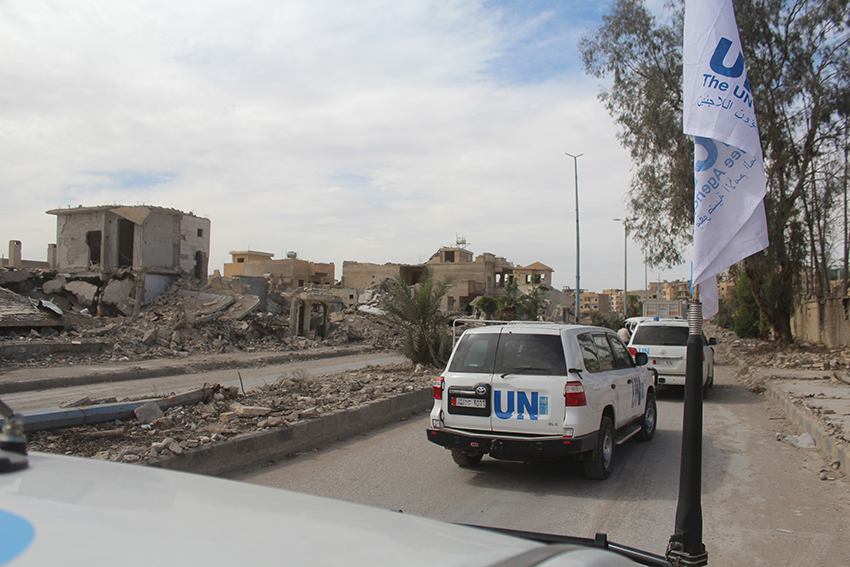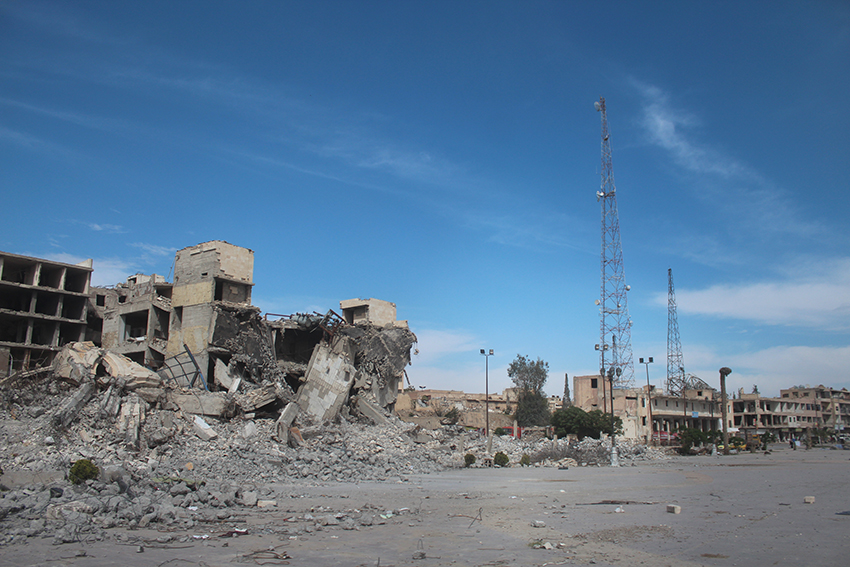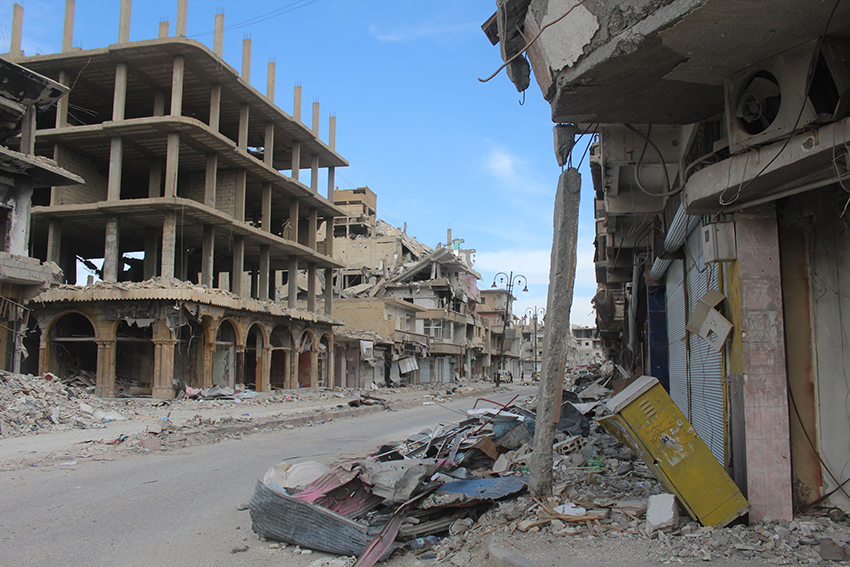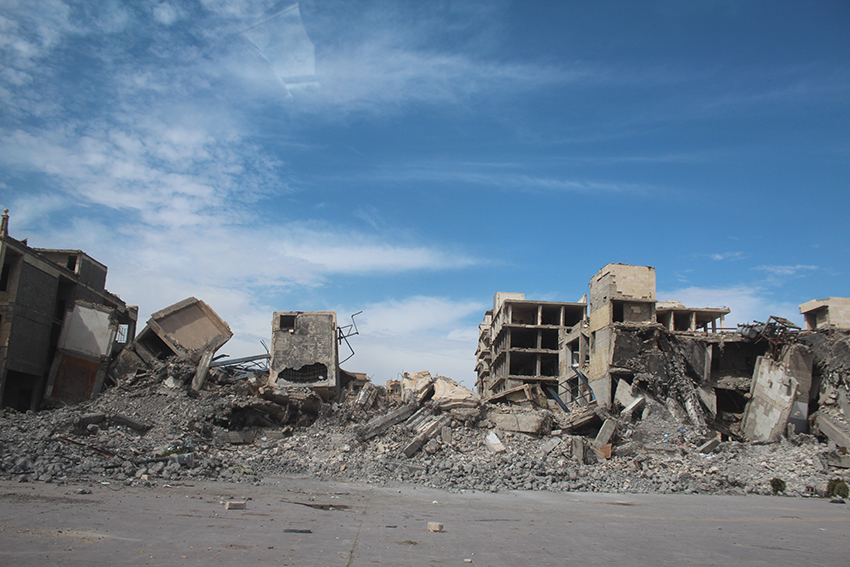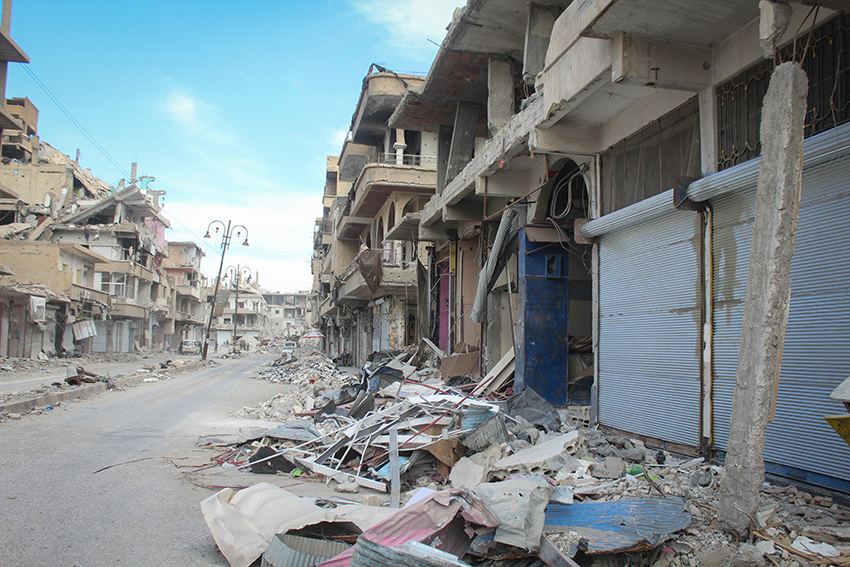First UN Humanitarian Mission to Raqqa City Post-ISIS
The protection and humanitarian needs in the post-ISIS Raqqa go far beyond the means and capacity of any humanitarian agency or a group of agencies.
RAQQA CITY, Syria – Raqqa city, once home to some 300,000 people, well known for its fertile agricultural land and deemed as the food basket for Syria was nearly deserted towards the end of hostilities in the area, with roughly 7,000 remaining under ISIS last days of rule, and the rest of the population scattered in camps in the north-east, in other displacement locations in Syria or in exile in neighboring countries and further afield. Today, tens of thousands of women, men and children have returned to their homes, with most, if not all, returning to nothing.
On April 1st, a United Nations inter-agency mission was able to reach Raqqa city for the first time since ISIS was driven out in October 2017. The UN team conducted a first-hand assessment of the situation in preparation for an urgent humanitarian response.
The UN team entering Raqqa city were shocked by the level of destruction, which exceeded anything they had ever seen before. A cascade of rubble lies along the streets with hardly a single building intact.
Rabae, one of the recent returnees to Raqqa city was displaced for over 9 months, “we ran away because of the airstrikes, death and destruction. Our home was destroyed…and we’ve returned to no electricity, contaminated water…criminals looting our homes even if we are only absent for 15-minutes,” she told the UNHCR protection team on the mission.
““We ran away because of the airstrikes, death and destruction”
With nearly the entire infrastructure totally destroyed, public services barely exist and no safe water or electricity. The widespread presence of explosive hazards, including unexploded ordnance, landmines and improvised explosive devices, particularly in those neighborhoods of the city that were the stronghold of ISIS towards the end of hostilities, pose a significant threat to civilians; some 130 civilians having been killed and a further 658 injured in blasts since the city was retaken from ISIS in October 2017.
In addition to unexploded ordnance, the UNHCR protection team on the mission, who met with women, men and the youth, identified numerous protection and other challenges, risks and threats, ranging from criminality, early marriages and other SGBV concerns, to lack of safe water, electricity, healthcare and education services. But these are just a few of the many challenges preventing people from regaining their dignified life.
A group of young 16-year old girls, who were returning from school, explained to UNHCR protection team the challenges they faced before and those they face today. Being displaced to villages around Raqqa city during the fighting, they lived for months in the open, in makeshift tents “in the middle of nowhere”. They told of how much they wanted to return to normal life, reason why they convinced their parents to return to Raqqa city. And they did, but only to live in a destroyed city, in constant fear of sexual harassment while walking in the street. The girls explained a common issue among girls living in Raqqa; families resort to marrying their daughters young during ISIS’s rule and till today only to protect them in a community that lacks security and rule of law.
A disabled man on the street told UNHCR team of his ordeal having to travel for hundreds of kilometers to Damascus only to access physiotherapy, at a cost that is far beyond his means. But he is not the only one having to go through this; many others also do, as medical facilities that could provide such services are nearly non-existent in Raqqa city and its surroundings.
Other men joined in to express their frustration over the prevailing insecurity in the city. Stories of houses being attacked by armed gangs and looted in the middle of the night appear to be a daily reoccurrence.
As the team continued to walk through the street, two middle-aged women working in a textile shop appeared to share their experience, needing to walk long distances a number of times a day to supply their homes with water, and having to resort to the help of their children at the cost of holding them back from school.
The children also have stories to tell about their trauma and missed schooling for years, in addition to being confined to their homes owing to fear of violence and the absence of a safe space for them to play with their peers, as most of the public parks were destroyed by ISIS. This is truly a generation lost.
For the tens of thousands who have returned to the war-torn Raqqa city, as for the hundreds of thousands still scattered in displacement within Syria and beyond, a return to normal life is a dream. And for this dream to materialize much needs to be done that goes far beyond the means and capacity of any humanitarian agency or a group of agencies. Looking at the massive destruction and infrastructure and livelihoods devastation, anyone would be at loss as to where to start. But the international community has to start somewhere. It is humanitarian imperative. UNHCR, UN sister agencies and other humanitarian partners are now embarking on a humanitarian plan of action aiming to ease the people’s suffering and to restore their trust in humanity and hope for the resumption of a “normal life”.

